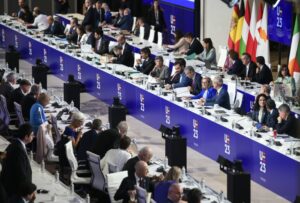COP29: Urgent action needed to foster a green economy

High air pollution levels in Bangkok on February 15, 2023 – Copyright AFP Lillian SUWANRUMPHA
In the lead-up to COP29 in Baku (Azerbaijan), as global temperatures exceed 1.2C due to planet-warming greenhouse gas emissions, fossil fuels still take a huge chunk of climate financing and investment.
COP29 has been dubbed the “climate finance COP” for its central goal: to agree on how much money should go each year to helping developing countries cope with climate-related costs. However, concerns have bene expressed that not all world leaders are set to attend the event.
COP29 is the world’s most important meeting on climate change. It is organized by the United Nations and the 2024 event, the 29th staging, with the event running from 11-22 November.
A new report – REN21’s Renewables for Economic & Social Value Creation module of the Global Status Report – reveals that investment in renewable energy accounted for only 7 percent of global GDP growth in 2023. On the plus side, this has created 16.2 million jobs worldwide.
REN21 is a renewable energy network seeking to connect governments, industries, NGOs and science globally to accelerate the shift to renewables.
REN21 also released the Global Overview in April 2024. It provided the big picture status of renewables in the wider energy system in the context of global challenges such as climate change, economic development and the geopolitical landscape.
Despite fossil fuel investments by banks decreasing by 9 percent last year, only 6 of the top 60 major banks in the world currently prioritize renewable finance, highlighting an urgent need to align capital flows with sustainable energy goals. This is set to be a key topic for COP29.
With fossil fuel subsidies at $616 billion renewables face significant barriers to scaling. This gap underscores the urgent need for targeted policy and finance shifts to support the transition to sustainable energy.
Action can still be implemented and the REN21 report demonstrates that the advantages of renewable energy extend beyond climate mitigation, showcasing how renewables drive sustainable economic growth, job creation, and resilience-building.
The report underscores the pivotal role of renewables in achieving the ambitious climate and social policy goals set in COP28. For example, renewables accelerate energy access and alleviate energy poverty, since 2000, renewable power has saved an estimated $409 billion in fuel costs.
Renewables can be distributed in remote areas and improve resilience during emergency situations, such as extreme weather events or wars. The report points out that decentralised renewable energy systems can enhance resilience by supporting essential services during extreme weather events and disasters, strengthening food security, water access, and climate adaptability across communities.
COP29: Urgent action needed to foster a green economy
#COP29 #Urgent #action #needed #foster #green #economy





